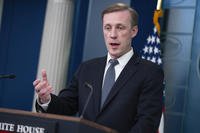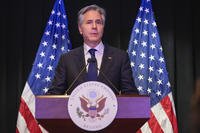In a major coup for Boeing and its fighter business, Saudi Arabia and the U.S. announced Thursday they've agreed to a deal in which the kingdom would buy a large new batch of F-15s, as well as upgrades to its existing fleet.
Here's what the White House said in its official statement:
Valued at $29.4 billion, this agreement includes production of 84 new aircraft and the modernization of 70 existing aircraft as well as munitions, spare parts, training, maintenance and logistics. These F-15SA aircraft, manufactured by The Boeing Company, are among the most sophisticated and capable aircraft in the world.This agreement will positively impact the U.S. economy and further advances the president's commitment to create jobs by increasing exports. According to industry experts, this agreement will support more than 50,000 American jobs, engaging 600 suppliers in 44 states, and providing $3.5 billion in annual economic impact to the U.S. economy.
This agreement reinforces the strong and enduring relationship between the United States and Saudi Arabia, and demonstrates the U.S. commitment to a strong Saudi defense capability as a key component to regional security.
The deal has been in the works for months, and it's the latest realization of Boeing's hope to get as much mileage as possible out of its proven but aging combat aircraft portfolio. Rather than design a brand new airplane, the company has tried to upgrade and improve its F-15s and F/A-18s to sell as "low-risk" compromises between cost and performance.
UPDATE: State and Defense Department officials said in a briefing at the State Department on Thursday that Boeing will deliver the first new F-15 in early 2015 and the first upgraded jet in 2014. The fighters will come equipped with all the latest refinements, including Active, Electronically-Scanned Array radars -- nicer than many of the U.S. Air Force Eagles's -- and a full whack of other weapons and sensors.
These include a new "Advanced Electronic Warfare System;" new reconnaissance pods; HARMs; JDAMs; Harpoons; AIM-9X Sidewinders; and AIM-120 AMRAAMs, according to DoD. The deal also includes training for Saudi pilots and airmen alongside the U.S. Air Force, said James Miller, the principal deputy undersecretary of defense for policy.
For its part, Boeing was pretty happy about the announcement. The company said this: "For Boeing, this agreement represents the continuation of an enduring partnership between the company and the Kingdom that dates back to 1945 when President Franklin D. Roosevelt presented a DC-3 Dakota airplane to King Abdulaziz Al-Saud, the founder of the Kingdom of Saudi Arabia," said company CEO Jim McNerney. "We appreciate the efforts of the Obama Administration and the trust of King Abdullah's government in finalizing the agreement, which will support tens of thousands of American jobs and help the Kingdom enhance its defense capabilities and diversify its workforce."
So there you are. Miller and Assistant Secretary of State for Political-Military Affairs Andrew Shapiro said the timing of this announcement was coincidental with this week's Iranian bluster and saber-rattling over the Strait of Hormuz, and not intended to send Iran a warning. The U.S. and Saudi governments signed their deal on Christmas Eve, the officials said, so they didn't want to announce it then, and today was the day they just happened to get all their ducks in a row.
As for Israel, Shapiro told reporters that every Foreign Military Sale in the Middle East is reviewed against the U.S. policy that Israel maintain its "qualitative military edge" over potentially unfriendly neighbors. This F-15 sale passed that test, Shapiro said, though he said he would not describe what had been said in discussions between the U.S. and Israel.
There were other unanswered questions as well: Miller said he did not know whether the Saudis wanted GE or Pratt & Whitney engines for their new fighters, or whether the jets would be partly assembled in Saudi Arabia. Miller said those details are between Boeing and the Saudis, and the company did not immediately address them in its statement Thursday.
Miller also said he did not know what the target date was for the completion of the new production run, but he did say the "50,000 jobs" the deal will create in the U.S. would last for about 10 years.








